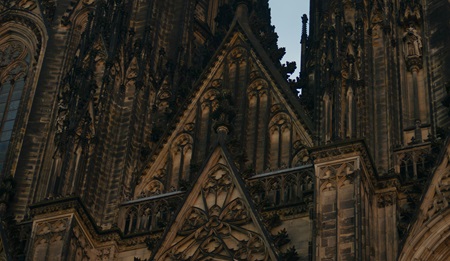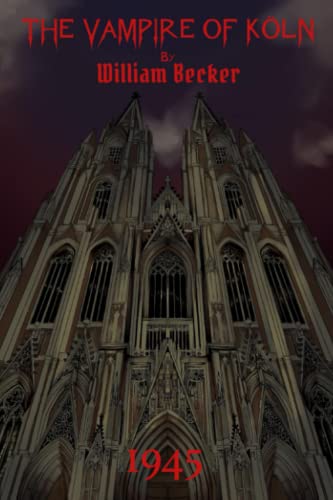
Book Spotlight | The Vampire of Köln by William Becker
Today the spotlight is on The Vampire of Köln by William Becker!
This is a historical horror set during World War II where an ancient evil is found lurking in the city of Cologne. I enjoyed reading the author’s previous book Grey Skies so I’m looking forward to this.
To give you a taste, I’m sharing the synopsis and excerpt from the book. Thank you to the author for this exclusive excerpt!

Genre: Horror
Pages: 247
Publication Date: 29 May 2023
Author: William Becker
Publisher: Independent
Synopsis
Set in the rubble of World War II Cologne, Germany, this bone-chilling tale follows the American First Army as they uncover an ancient evil lurking in the shadows. Each chapter introduces a new character falling prey to the creature’s insatiable thirst, their gruesome deaths described in vivid, stomach-churning detail. From a young boy to a hardened soldier, no one is safe from the vampire’s grasp.
As the body count rises, the survivors must band together and find a way to defeat the monster before it’s too late. But as the vampire’s power grows stronger with each kill, they realize they may be facing an evil beyond their wildest nightmares.
The Vampire of Köln is a heart-stopping journey into darkness, a must-read for horror and suspense fans craving a tale that will leave them sleepless at night.
Excerpt
The hulking treads of an M4 Sherman Tank rumbled past the remains of a broken building, crushing the discarded bits of a charred newspaper. The newspaper broke into countless smaller black pieces that drifted through the air like pieces of hellish snow. Any pieces that were not completely pulverized into dust by the tank were caught in the wind, sailing aimlessly into the faces of the Allied soldiers walking alongside the tank and the front of the 2½-ton 6×6 truck, more commonly known as a “deuce,” following several yards behind. Several specks of the charred newspaper sailed through the air, whirling and turning as they did, before disintegrating in an adjacent alley.
The ten-year-old boy sitting in the alley felt a rumble in his stomach. He pressed his back against the ash covered brick wall, allowing his hand to mindlessly caress the contents of a bag of peanuts. He had opened the peanuts days ago, but had only been able to stomach the taste and resulting burning sensation in his throat enough to wolf down just one peanut. The boy found himself pondering if peanuts could go bad, but at this point, eating a piece of concrete would be satisfactory if it would give him enough energy to carry on. Carry on, but to what? The boy wondered. Regardless, he didn’t feel particularly drawn to eating or putting any effort in to sustain himself.
The boy hadn’t set eyes upon his mother in nearly a week, which by his recollection, was about the same amount of time since he had put a square meal in his body. The boy had spent the majority of this time in a state of disarray, floating like a piece of paper in the wind and wafting from place to place on the German occupied side of the river.
Still, the lonely absence that had fallen upon the city in the past years like a casket veil was one that he had grown used to, to the point of becoming synonymous with the city. As the Allies passed over the water to this side of the city, the air seemed to retain the lonely qualities, but with a degree of allegorical sunshine piercing the very edges of the fog. Whereas the silence from before seemed to spell a deadly anticipation of battle, this silence was of an uncertain emptiness. As he watched the soldiers give him curious looks from the street, he felt an urge to throw himself out into the street and allow fate to determine if he should survive in front of the convoy of soldiers, tanks, and deuces.
When he was still around, the boy’s father would’ve hated to see his hometown overrun with such putrid, unpatriotic scum hellbent on having a say in German affairs, but the boy’s mother generally had been rather apathetic about the war efforts. These conversations, which were usually over tea or dinner, were conversations that the boy was not a participant in, but a bystander endlessly spacing in and out of reality and comprehension. It was during these conversations that the boy felt more at home being a shadow on the wall, so it became peculiar and contradictory to the boy that he should be the one rather than his parents having to suffer the consequences of the war that these conversations centered around.
The only solid piece of information that the boy found himself holding onto for hope was that the bombings, gunfire, and tank fights had generally subsided in the last two days since the Allies had crossed the river, so maybe the doomsday prophecies from his father were not entirely grounded in reality. At this point in the boy’s brief existence, it had been the first time that he had been forced to act on his pure intuition, and at that moment, his intuition told him to head further from the river.
It was three days ago that he, along with some other refugees and children, had begun seeking shelter in the prodigious Cathedral Church of Saint Peter. One of the men who worked there, who had claimed some form of authority over the church that the boy couldn’t recall the nature of, had preached that the Cathedral was a holy place and as such, no sensible mortal man would take his senseless violence there. When the boy questioned the holes in the ceiling and the rubble, the man had responded that they had been “collateral damage” and “completely accidental.”
The boy shoved another peanut into this month, holding back teary eyes and ignoring the pain of a steadily swelling throat as he did so, then threw the bag of peanuts to the ground in disgust. There was that old stereotype about Americans loving peanuts and baseball, so maybe they would be grateful for the painful protein.
The boy climbed to his feet, coughing as he did, then set upon his way, scurrying through the alleyways towards the Cathedral, whose twin spires could be seen from nearly anywhere in the city. They loomed over everything, the gray clouds offsetting the dark colors of the spires, which themselves were scraped with burn marks and gray stripes from ash. Nightfall was approaching and being caught out in the streets was not something he was interested in. The vast unfamiliarity of the city at night was something that terrified him.
He crawled through shattered buildings and piles of rubble blocking his path, careful as to mask his footsteps beneath the noise of the Allied troops hauling their way through the streets. As he darted from street to street, he would occasionally catch a glimpse or shadow of someone quickly moving in between the buildings.
Other than that, and the troops on some of the streets, the alleys and buildings were abandoned and entirely devoid of life. Just a month ago, things had seemed like they were beginning to turn around and life might soon return to the city, but now, he was surrounded by a graveyard of hollow shells that spoke of a time of peace long past.
Finally, the boy wandered onto a street leading directly towards the Cathedral Square. The monstrous building now towered in front of him with a size so gargantuan that he feared it might topple over and crush him entirely. In the haze of fog and dust, it still appeared intact. The very existence of the building was an oddity that had dominated his childhood, for it could be seen from any window looking in its direction, from any of the streets in Köln, and even across the Rhine. It appeared only more intimidating and emblematic of unstoppable power, especially being one of the few buildings standing in a recognizable state. The Cathedral Church of Saint Peter was an otherworldly king surrounded entirely by a sea of peasants who had been devastated by the illnesses and various ailments of war.
The boy crawled under the barrel of a destroyed German Panther Tank at the edge of the street. He pressed his knees and elbows against the ground, allowing them to return to him with the greasy residue of ash. There was a large hole through the rotating head of the vehicle, suggesting another tank or some artillery had disabled it, leaving the shell to wither in the empty street. In front of the Cathedral’s southern entrance, an Allied Sherman Tank (the very same that could have killed the German tank, the boy thought) stood with what he assumed was its crew. Six soldiers were standing in a circle around the front of the tank, smoking cigarettes and laughing in a language he did not understand.
It was impossible for the boy not to notice the rifles strapped along the backs of the soldiers, weapons which had probably been fired, weapons that had already been used to kill, and weapons that could most likely be used against him. He had heard about the American policy of shooting first and asking questions later, so risking such a conflict was not an option.
Large portions of the bombed-out buildings that lined the edges of Cathedral Square had fallen out onto the bricks, creating piles of rubble, making the once grand square look like a landfill.
After a few moments of watching the Americans babble in their strange dialect in an attempt to eavesdrop, the sun began to slip towards the horizon in a position that caused a partial eclipse behind the twin spires of the cathedral. The sun peered through the clouds, casting deep shadows on the ruined buildings and creating a red glow in the sky that made the city look as though it was on fire. There was something about the city’s immense beauty in flames that made him feel lonely.
The riverside was just a couple hundred feet away from the cathedral, and directly across from the church was the destroyed bridge that had been the main road linking the East and West sides of Köln. The boy thought he could run fast enough to swim across the river and get away from the soldiers. Perhaps people were still taking shelter inside of the cathedral and maybe they could keep him safe.
Excerpt from The Vampire of Köln © 2023 by William Becker. All rights reserved.
Cover photo by Jakob Pfalz






